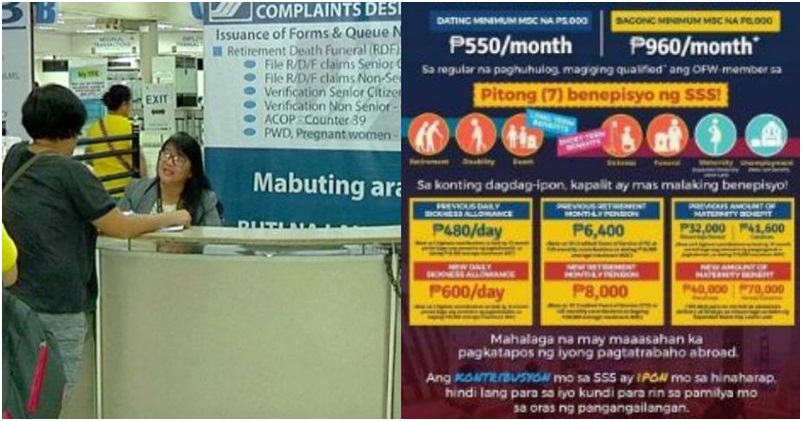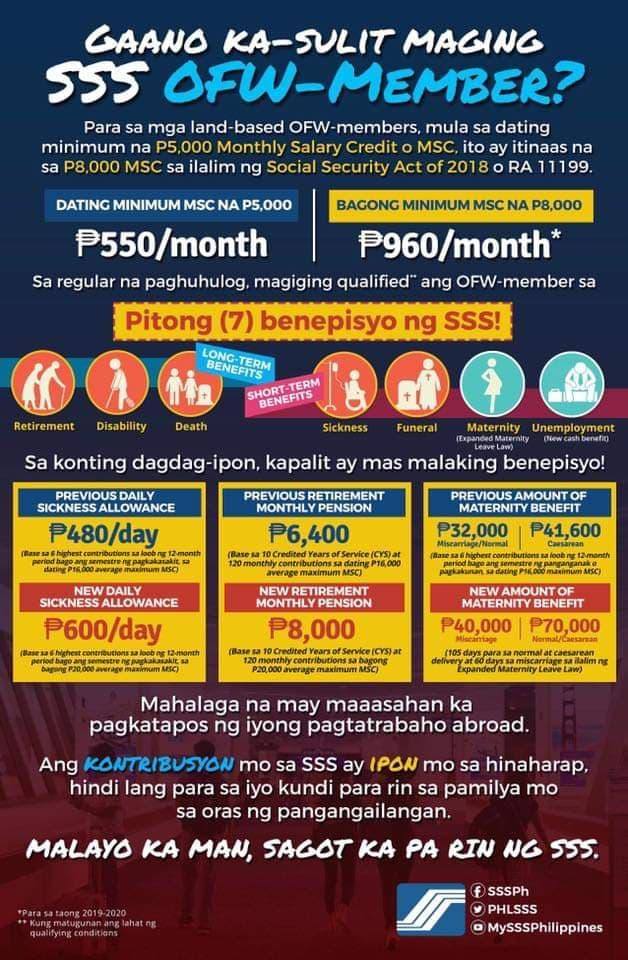It is strongly advised that all Filipinos continue to pay their SSS every month, as the Social Security System (SSS) will assist us in the future when we retire. If we work for a company in the Philippines, it is normally easier to update our SSS because it is deducted from our salary every month. However, for OFWs, self-employed people, or those who are unemployed, we must go out of our way to voluntarily pay our SSS contributions. So, why is it necessary to remain a member and maintain an SSS account? Here are the seven advantages of this membership program.
Also Read: How to Pay SSS Contributions as an OFW Abroad
Working in the Philippines has distinct advantages that not everyone recognizes right away, such as the ability to choose a job close to home, the ability to return home to your family after a day’s work, and membership in the Social Security System (SSS), a state-run insurance program that provides members with health and retirement benefits.
This is important because the state fund, through short-term credit advances and other long-term benefits, will help you get through difficult times.

Here Are the Benefits of an SSS Member this 2021
Any Filipino may join the SSS either through their employer (private or public) or through voluntary membership.
Furthermore, under the Kasambahay Law, employers of household service employees are expected to pay their housekeepers’ SSS contributions.
Also self-employed, freelance employees, unemployed citizens, and non-working spouses can join as long as they can pay their monthly dues.

SSS members are eligible for the following privileges, which they will use for the rest of their lives:
-
Sickness Insurance
If a member becomes ill or wounded unexpectedly, they may receive a regular cash payout for the number of days they cannot function.
To be eligible for this benefit, the member must be confined at home or in a hospital for at least four days and have made at least three months of contributions over the previous 12 months.
-
Maternity Leave
Maternity benefits in the form of regular cash allowances are available to female SSS members who have recently given birth or had a miscarriage.
Similarly, participants must have made at least three months of SSS contributions in the previous 12 months to be eligible for this advantage.
-
Disability Insurance
Members who are involved in an accident or are diagnosed with a disease that may result in partial or total disability may qualify for this benefit. Depending on the member’s cumulative monthly contributions, this payment can be paid as a monthly pension or as a lump sum.
Those who have contributed at least 36 times will be eligible for a monthly disability pension. Otherwise, they will receive a lump sum payment depending on the number of donations they have received.
-
Pension Benefit
This is often granted as a monthly pension or as a lump sum amount to members who are unable to work due to old age.
Those over the age of 60 who are no longer working and have made at least 120 monthly contributions before the semester of retirement may qualify for the retirement benefit. This benefit is also automatically given to those who meet the age of mandatory retirement at 65, regardless of employment status.
-
Death Insurance
A monthly death pension will be paid to the primary beneficiaries (spouse and dependent children) of a deceased SSS member who made at least 36 monthly contributions.
However, if the contributions are less than what is expected, the beneficiaries will receive the benefit in a lump sum. If the member has no primary beneficiaries, the lump sum payment would be paid to the secondary beneficiaries or dependent parents.
-
Funeral Benefit
If an individual pays for the burial expenses of a deceased SSS member, they can apply for SSS funeral benefits. The only stipulation for this privilege is that you make at least one monthly contribution as a volunteer, self-employed, or OFW member.
-
Salary Loan
Members may also get cash loans from the SSS to help them meet their short-term credit needs. It has a ten per cent annual interest rate, and the duration of the loan payment is determined by the number of contributions you’ve received.
To be eligible for this advantage, the member must have made at least six monthly contributions in the previous 12 months before submitting a loan application. Furthermore, the borrower does not have any unpaid SSS loan balances.
SSS membership provides a plethora of perks that applicants will enjoy for the rest of their lives, as long as they fulfil the agency’s minimum requirements.
-
Unemployment Benefit
It is a cash benefit provided to covered workers that is also known as unemployment insurance or involuntary termination benefit, which covers kasambahay and OFWs (sea-based and land-based) who are involuntarily separated from employment (e.g., as a result of retrenchment or downsizing, termination or cessation of operations, implementation of labour-saving devices, redundancy, etc.).
To qualify for this benefit, the member:
- should not be over 60 years old at the time of involuntary separation; not over 50 if an underground or surface mineworkers; and not over 55, if a racehorse jockey.
- had paid at least 36 monthly contributions, 12 months of which should be in the 18-month period immediately preceding the month of involuntary separation.
Note: An employee is ineligible for this benefit if he/she has been involuntarily removed from their job due to any of the following reasons:
– Serious misbehaviour,
– Committing a crime or offence, or
– Deliberate disobedience to lawful orders,
– Similar situations, such as abandonment,
– Willful and habitual neglect of responsibilities, – Willful inefficiency,
– betrayal/conflict,
– Fraud or intentional breach of trust or loss of confidence,
– Disinterest/dishonesty.
If eligible, the employee is awarded an amount equal to twice the member’s average monthly salary credit (AMSC).
The benefit is given in the form of a one-time payment, and the application must be made within a year from the date of involuntary separation.
-
Employees’ Compensation (EC) Programme
Employees’ Compensation (EC) is a program that assists employees who are injured or killed as a result of a work-related injury or accident. Beginning in June 1984, benefits under the EC program can be combined with benefits under the social security program.
To be eligible for the Sickness Benefit:
- The illness or accident must be related to the job.
- The employee has disclosed the illness or accident to SSS, and SSS has been told of it.
To qualify for the Death Benefit:
- The member must have paid at least one (1) month contribution before the semester of death.
If qualified, the employee will be awarded the following amount based on these criteria:
Temporary Total Disability (TTD) – Minimum of P110 and maximum of P480, effective May 19, 2018.
Permanent Partial Disability/Permanent Total Disability (PPD/PTD)
– The amount of minimum pension is P2,000
– Member is entitled to an additional pension amounting to P1, 150 effective January 1, 2017.
– Supplemental or Carer’s allowance increased to P1,090 effective May 19, 2018
– 13th month
The dependent minor children are entitled to a Dependent’s Pension (for total disability) equivalent
to 10 % of the monthly pension. Only five (5) dependent minor children beginning from the youngest
are entitled to dependents pension, without substitution.
Death
– The amount of benefit granted is equivalent to a monthly pension plus a 15% difference.
– The dependent minor children are entitled to dependents pension equivalent to 10% of the monthly pension. Only five (5) dependent minor children beginning from the youngest are entitled to dependent’s pension, without substitution.
– The amount of minimum pension is P2,000,
– Member is also entitled to P1,150 additional benefit effective January 2017.
If you want to learn more about SSS’s new developments, you can visit their official website here.
ALSO READ: How to Contact SSS While Abroad: Toll Free Number, Chat & Email